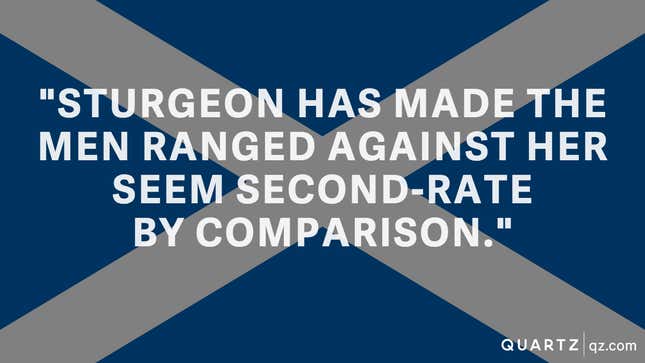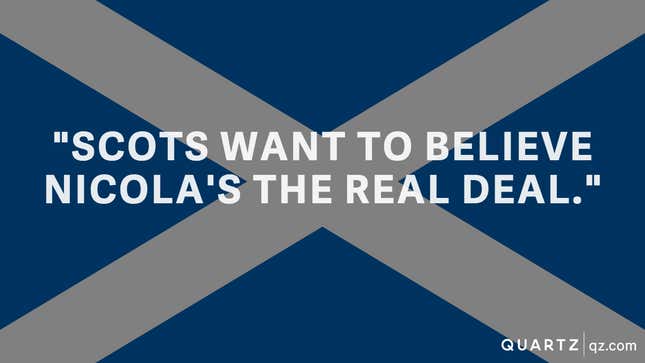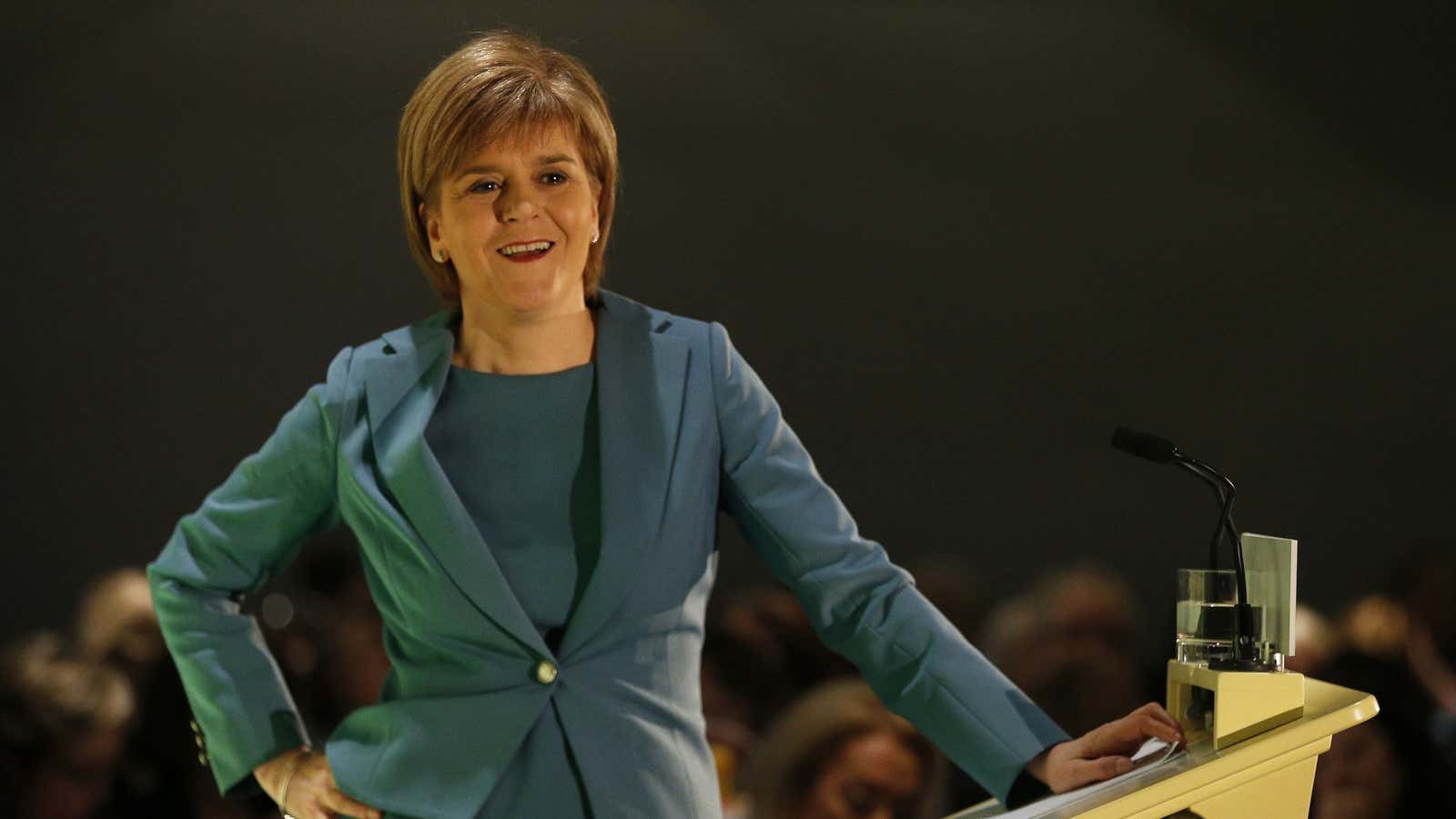Britons head to the polls to cast their votes in the country’s general elections on May 7, 2015. Six-hundred and fifty individuals will be elected as members of parliament (MPs) and make their way to Westminster. One person who isn’t running for a seat at Westminster, but who has nevertheless played a substantial role in shaping the entirety of the election—and, potentially, the after-election negotiations, too, which she’s insisted on leading—is the first minister of Scotland and the head of the Scottish National Party (SNP), Nicola Sturgeon.
The first minister gained a flurry of international attention after a televised party leaders’ debate in early April. Her well-received performance is credited with blowing the upcoming general elections wide open, with a third of Labour voters surveyed saying she “won it.”
Sturgeon, 44, has been first minister of Scotland since Nov. 2014. “Fairly standard, normal, working class” is how she has described her upbringing—a background which includes a council house and a state school. She entered politics young, joining the SNP at 16 (asked what sort of advice she’d give her 16-year-old self, Sturgeon said, “Lighten up,” and imagined young Nicola would tell her to “eff off” by way of reply). She first stood for election in 1992, which made her the youngest parliamentary candidate at the time.
Between then and now, she served in the Shadow Cabinet as cabinet secretary for health and wellbeing; incidentally, at the time of Scotland’s swine flu outbreak. She also served as deputy party leader for the SNP under Alex Salmond, who spearheaded the “Yes” movement during the 2014 independence referendum.
But much of Sturgeon’s political reputation derives from her policies. For one, she wants to get rid of Trident, Britain’s nuclear defense program. But she also has more practical goals: As The Telegraph notes, “she wants to remove the £26,000 annual benefits cap and get £180 billion more public spending; she wants the welfare system to be more generous and the minimum wage to rise to £8.70 an hour.”
Now, what sort of impact are we talking about? And why has she stood out? Electorally, of the 59 MPs that can be sent to Westminster from Scotland,50 SNP candidates are more or less currently on course to be elected. There was even a poll taken earlier in April that hinted all 59 seats might go to the SNP. “As a result,” Matt Singh, a polling analyst for Number Cruncher Politics, tells Quartz, “the SNP’s potential support for a Labour-led government—and the terms on which it would be given or withheld—has become increasingly salient.”

“Sturgeon’s performances in the [UK]-wide debate stood out, with—on average—over 20% of the respondents to the snap polls considering her to have won the seven-way debate,” Singh explains. “This was particularly impressive given the small fraction of those ‘votes’ that would have come from her own party’s supporters.”
Harry McGrath, who reviewed a biography of Sturgeon for The Scottish Review of Books, tells Quartz that—by his estimation—“Nicola has stood out because she is a woman in a political world previously dominated by men. But, beyond that, she has come across as extremely sharp and articulate to the extent that she has made the men ranged against her—[David] Cameron, [Ed] Miliband, and [Nick] Clegg in particular—seem second-rate by comparison.”
David Torrance, who wrote the biography in question, tells Quartz via email that Sturgeon has “stood out largely because she’s new and fresh to most voters in the rest of the UK (in Scotland she’s been well-known and rated for a long time, almost eight years). She’s articulate, apparently sincere, and unlike other [major] party leaders in that she’s a) female and b) didn’t go to a private school in the south of England.” (She attended Dreghorn Primary and Greenwood Academy in Ayrshire, and graduated from the University of Glasgow in 1992. She attributes her political success to the tuition-free education she received at Glasgow.)
“Elections can be boring so new faces have a chance to shine, like Nick Clegg in 2010,” Torrance adds. “She also appears to offer something different, i.e., independence for Scotland and also more ‘progressive’ politics in the rest of the UK.”

But Torrance thinks Sturgeon might be more flash than substance, at times. “Sturgeon is a politician, and although talented, she’s stronger on presentation than coherent, credible, deliverable policies,” he notes. “Even so, a lot of Scots want to believe that she’s the real deal, different, honest, and likely to deliver what she promises to, and for a politician in this apathetic, cynical, anti-politics age to get 70% approval ratings (in Scotland, though [she is] also increasingly popular across the UK) is quite an achievement.”
“She did have a good track record when she was deputy first minister and health secretary,” Dr. Thomas Lundberg, a lecturer in politics at the University of Glasgow, tells Quartz, “so I’m not surprised that she has risen to the occasion. There are some concerns about what will happen if Salmond wins the seat he is contesting and goes to Westminster—will he be a back seat driver?”
“I suspect that he may try, but that Sturgeon will quickly assert her authority,” Lundberg theorizes. A new STV news poll released on April 29 suggested again that the SNP were on course to win all 59 seats in Scotland, and—if that holds true—establishing her authority shouldn’t be hard.
